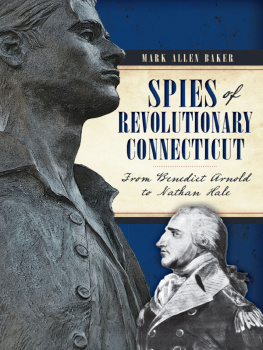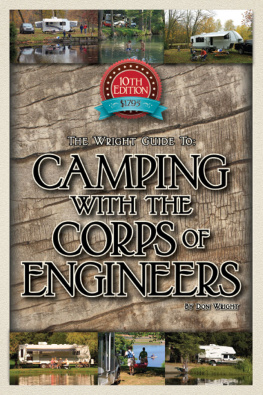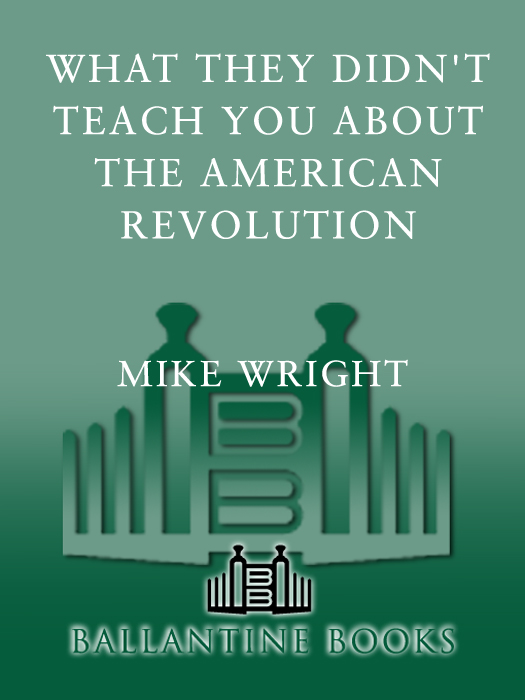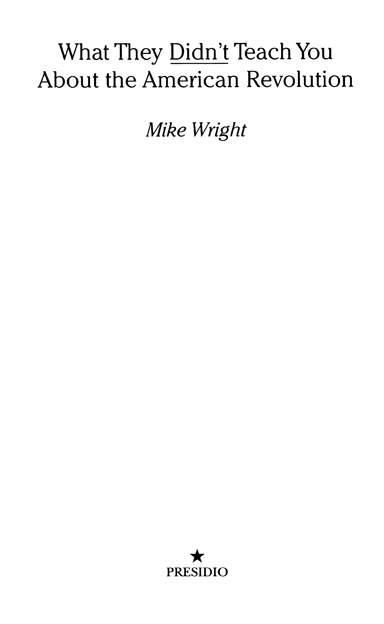Copyright 1999 by Mike Wright
Published by Presidio Press, Inc.
505 B San Marin Drive, Suite 160
Novato, CA 94945-1340
All rights reserved. No part of this book may be reproduced or utilized in any form or by any means, electronic or mechanical, including photocopying, recording, or by any information storage and retrieval systems, without permission in writing from the publisher. Inquiries should be addressed to Presidio Press, Inc., 505 B San Marin Drive, Suite 160, Novato, CA 94945-1340.
Library of Congress Cataloging-in-Publication Data
Wright, Mike, 1938
What they didnt teach you about the American Revolution / Mike Wright.
p. cm.
Includes bibliographical references ().
eISBN: 978-0-307-54914-3
1. United StatesHistoryRevolution, 17751783Miscellanea.
I. Title.
E209.W77 1999
973.3dc21 99-19699
v3.1
The Revolution was effected before the war commenced. The Revolution was in the minds and hearts of the people. This radical change in the principles, opinions, sentiments, and affections of the people, was the real American Revolution.
John Adams, 1818
Sacred cows make the tastiest hamburger.
Abbie Hoffman, remembered on his death, 1989
I have sworn upon the altar of God, eternal hostility against every form of tyranny over the mind of man.
Thomas Jefferson, letter to Dr. Benjamin Rush,
September 23, 1800
Contents
A Chronology of the War
1597: British Transportation Act approved
1607: Jamestown, Virginia, settled
1608: Samuel de Champlain founds Quebec for France
1609: British Pilgrim separatists move from Amsterdam to Leyden, the Netherlands. Two ships headed from England to Virginia wrecked in the Bermudas, inspiring Shakespeares The Tempest
1610: Don Pedro de Peralta establishes Santa Fe, New Mexico, for Spain
1619: First boatload of women arrives at Jamestown. First elected assembly in America. First Africans sold in Jamestown. First Thanksgiving celebrated near Jamestown
1620: Puritans establish Plymouth Plantation, Massachusetts
1622: Slide rule invented
1625: Dutch found New Amsterdam
1627: 1,500 London children kidnapped and sent to Virginia
1629: English capture Quebec from French
1636: Harvard University founded in Massachusetts
1638: First printing press set up in America
1642: English civil war. Three hundred thousand die in China flood. Massachusetts enacts law mandating parents educate their children
1643: New England Confederation
1645: Navigation Acts passed
1666: Great fire of London. Pre Jacques Marquette arrives in Canada
1669: Death of Rembrandt
1670: Hudson Bay Trading Company granted charter
1681: Matches invented. William Penn granted land patent in North America. La Salle sails Mississippi River
1688: Lloyds coffeehouse in London becomes insurance center
1689: King Williams War
1690: First paper money in America. In Boston, John Harris publishes first newspaper in America; its suppressed after one issue
1692: Salem, Massachusetts witchcraft trials
1693: College of William and Mary founded
1702: Queen Annes War
1704: First regular newspaper published in America, John Campbells Boston Public Advisor
1739: War of Jenkins Ear
1740: King Georges War (War of Austrian Secession)
1742: First performance of Handels Messiah
1744: First baseball game (rounders) played in England
1746: Benjamin Franklin begins his research into electricity
1752: Gregorian calendar adopted
1756: French and Indian/Seven Years War. Composer Wolfgang Amadeus Mozart born
1764: Sugar Act passed
1765: Stamp Act annulled
1767: Townshend Acts passed. Mason-Dixon Line established
1770: Boston Massacre
1773: Boston Tea Party
1774: Coercive (called the Intolerable Acts in America) Actspassed. Thomas Jefferson writes Summary View of the Rights of America. British Loyalists leave America for England and Canada
1775: Battles of Lexington and Concord, Massachusetts. England declares Massachusetts in state of rebellion. First American abolition society founded. American Revolution begins
1776: Declaration of Independence written. Washington wins Battle of Trenton
1777: Howe defeats Washington at Battle of Brandywine, Pennsylvania. Articles of Confederation adopted (ratified in 1781). Winter at Valley Forge
1778: France recognizes American independence. Gates defeats Burgoyne at Battle of Saratoga, New York
1781: Washington defeats Cornwallis at Battle of Yorktown, Virginia
1783: Treaty of Paris ends American Revolution. United Empire Loyalists (Tories) settle in Canada
1786: Shays Rebellion
1787: U.S. Constitution written. Northwest Ordinance written
1788: Rhode Island rejects Constitution. New Hampshire ratifies Constitution, making adoption formally effective. Final Congress of Articles of Confederation adjourns
1789 Mutiny on the Bounty. French Revolution begins. Pennsylvania legislature repeals ban on public performance of stage plays. First Congress of Constitution convenes in New York City. First Congresss first bill proposes raising of revenue; its first measure is a taxbill. George Washington sworn in as first U.S. president
1789: Congress submits twelve proposed amendments to the Constitution
1790: Congress votes to build capital city on the Potomac River. First U.S. census
1791: Bill of Rights approved
Introduction
What is it that so fascinates us about the American Revolution? It is a seemingly simple question but one without a simple answer. The Revolution is (1) a glorious period, (2) a glamorous period, and (3) a period that changed our lives, no matter that we werent around at the time and may not recognize that our lives were changed.
Glorious? Maybe, maybe not. The Revolution was a fraternal and civil war that may have pitted at the most one third of us (those who wanted the colonies to separate from Britain) against another third (those who wanted to remain with Britain), with the rest (the final third) not caring one way or the other. For all, lives were disrupted, government was altered beyond imagination, and homes and existence were, at the least, threatened.
Glamorous? The eighteenth century saw people die of diseases that today can be cured with less than a dollars worth of medicine. A medical treatment often used in the eighteenth century was also commonly used in ancient Egypttrephination, in which a surgeon used a cylindrical saw to cut a hole in your skull to release bad vapors. The surgeon, incidentally, doubled as your barber, which is why barber poles are made of red and white stripes, white bandages and red blood.












